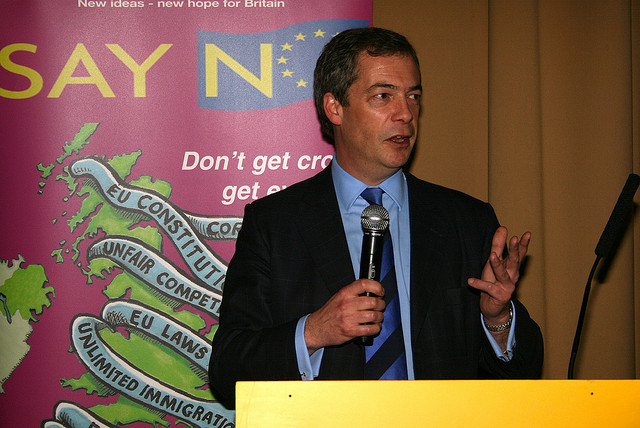It is political inequality that represents British democracy’s real crisis
People in Britain today feel both powerless and isolated when it comes to political decision making in Westminster – none more so that Britain’s white working class population who feel less confident in their ability to influence the political process than others. But these are concerns shared by a broad cross-section of society. Low levels of political trust in the political elite, lower voter turnout rates and the rise of Ukip are mere symptoms of this wider dilemma, say Alex Glennie and Glenn Gottfried.
In by-elections held Last Thursday, UKIP defeated the Conservatives in Clacton and ran the Labour Party close in Heywood and Middleton. The results provide a clear indicator of the growing disconnect between the British public and the governing class.
While public disenchantment with politics is not new (as evidenced by the steady decline in voter turnout over the past decades), an analysis of how class fits within this debate has received considerably more attention in recent years. The work of researchers such as Rob Ford and Matthew Goodwin have brought Britain’s white working class – often portrayed as a ‘left behind’ group – to the forefront of explaining both public political disaffection and the rising popularity of Ukip.
In IPPR’s new report on the white working class and disengagement in Britain, we challenge some of these assumptions around white working class ‘alienation’. Through new and nationally representative polling, we aimed to ‘take the temperature’ of different groups in British society and assess their views on both their own and the country’s future. The results show that on many of the key issues – such as the effects of migration, and concerns about insecurity at work and the future of public services – attitudes differ relatively little between the white working class (defined according to occupational markers) and those considered to be middle class. Age appears to be a much more salient factor in driving differences in attitudes. However, it is clear that the white working class is the most pessimistic of all social groups in Britain, with very low proportions showing much confidence that things will get better in the future for themselves and their communities.
For politicians from across the political spectrum, one of the most concerning findings from our polling relates to views on the state of British democracy, which show that the public – and particularly the white working class – feel both powerless and isolated when it comes to political decision making in Westminster. Only 31% of Britain’s white working class think democracy in Britain works for them, but Britain’s middle/upper middle class are only marginally more optimistic (43%).
Well over half of respondents to our poll believe that the political system in the UK does a bad job at addressing their problems (68% of Britain’s white working class and 59% of middle/upper middle classes (ABC1). The data also show a belief within the white working class (and more broadly) that the system is rigged to favour the elite. This raises serious questions about whether our democratic institutions are responding to the interests of the public they are supposed to serve.
Although no one is formally excluded from the political process in the UK, there is reason to believe that some groups enjoy more political influence than others. In the United States lobbying has become the norm of political life, however there are worrying signs that it is becoming more widespread in the UK. By 2007 an estimated 14,000 people were already employed in the British lobbying industry while in 2011 it was thought that the financial service industry alone spent roughly £92 million lobbying politicians and service regulators. Political donations by wealthy donors are also increasing in the UK. In 2010, 164 individuals donated £50,000 or more to one of the three main political parties – up from just 28 individuals in 2001 (see Wilks-Heeg essay).
Concurrently, increasing numbers of the less affluent are removing themselves from participation in electoral politics. IPPR research has shown that in the 2010 general election, only 53 per cent of those within the lowest income quintile voted, compared to 75 per cent of those in the highest income quintile. Unequal turnout in elections matters because politicians tend to prioritise the preferences of those who do vote over those who don’t. Furthermore, as politicians do more cater to the interests of groups that do vote, those within non-voting groups see less reason to participate in elections. The less they participate, the less likely it is that politicians will heed their interests, and the less politicians address their concerns the less likely they will turn out to vote – thus leading to a ‘vicious cycle’ of political disaffection.
These are just a few examples of political inequality which we believe represents the real crisis in British democracy. The white working class undoubtedly feel less confident in their ability to influence the political process than others, but these concerns are shared by a broad cross-section of society. Low levels of political trust in the political elite, lower voter turnout rates and the rise of Ukip are mere symptoms of this wider dilemma.
In our view, a policy response that focuses solely on reducing immigration numbers or getting the UK out of Europe will do little to reverse the continuing trend of public detachment and sense of powerlessness in politics. A new democratic reform agenda must pursue greater transparency and accountability in government as well as making the political process more accessible to all citizens. At IPPR we’ve advocated measures that will decisively disperse concentrations of political power and reinvigorate political life within the communities which feel most alienated. Without this, it is unlikely that the residents of Clacton-on-Sea, or any other community, will reconnect with the political process in a meaningful way over the long term.
—
Note: this post represents the views of the author and not those of Democratic Audit or the LSE. Please read our comments policy before posting.
—
 Alex Glennie is Senior Research Fellow at IPPR
Alex Glennie is Senior Research Fellow at IPPR
 Glenn Gottfried is Quantitative Research Fellow at IPPR
Glenn Gottfried is Quantitative Research Fellow at IPPR






 Democratic Audit's core funding is provided by the Joseph Rowntree Charitable Trust. Additional funding is provided by the London School of Economics.
Democratic Audit's core funding is provided by the Joseph Rowntree Charitable Trust. Additional funding is provided by the London School of Economics.
It is political inequality that represents British democracy’s real crisis : Democratic Audit UK https://t.co/Gpb8Q6Sg4A
#Political #inequality is the real crisis in #British politics. My colleague @alex_glennie and I at @democraticaudit https://t.co/gge3EcLwce
It is political inequality that represents British democracy’s real crisis @IPPR https://t.co/clmXRc60j1
Leestip voor NL politici en hun adviseurs. En ook voor journo’s op het Binnenhof natuurlijk https://t.co/PDmn2GA3wI #politiek #strategie
It is political inequality that represents British democracy’s real crisis https://t.co/6oocBiyR1N https://t.co/nqS5ypoiup
It is political inequality that represents British democracy’s real crisis https://t.co/Tk1Hqlgj2z
It is political inequality that represents British democracy’s real crisis https://t.co/wHhTRLaH22